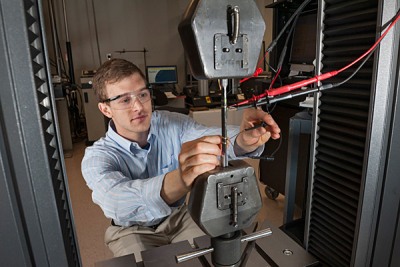Zachary Melrose, who is pursuing a doctoral mechanical engineering degree at the University of Delaware (UD), has received a National Defense Science and Engineering Graduate (NDSEG) Fellowship to sponsor his doctoral research on developing multipurpose structural composites by selectively integrating nanomaterials to composites.
 Zachary Melrose, a UD doctoral student in mechanical engineering, has been awarded a prestigious National Defense Science and Engineering Graduate Fellowship. (Photo by Evan Krape)
Zachary Melrose, a UD doctoral student in mechanical engineering, has been awarded a prestigious National Defense Science and Engineering Graduate Fellowship. (Photo by Evan Krape)
Carbon nanotubes can be used as the basis for multipurpose structures that are capable of sensing and healing damage by themselves. Moreover, the nanomaterial finds use in energy storage, electromagnetic interference shielding, and thermal management applications.
Melrose plans to leverage the potential of this nanomaterial as part of his doctoral research work at UD’s Center for Composite Materials (CCM). Assistant Professor Erik Thostenson is advising him on the research. Melrose explained that the present method for in-situ damage sensing requires homogenous dispersion of carbon nanotubes into composites to form an electrically conductive network.
Melrose’s plan is to develop the method by selective modification to manufacture a material having a controlled hierarchy. Contrary to the existing single-sensor method, the controlled structure may form a network of sensors, informed Melrose. At present, he is exploring two different processing methods. He also intends to use other materials, which include graphene, a carbon nanomaterial with superior electrical conductivity, flexibility and strength.
Melrose’s doctoral research is based on his undergraduate work done at CCM, also under the advice of Thostenson. According to Melrose, UD is the ideal place to study about composites.